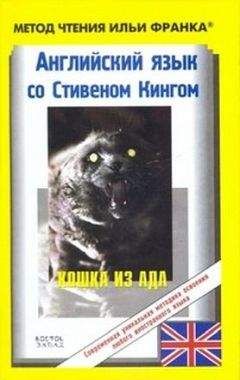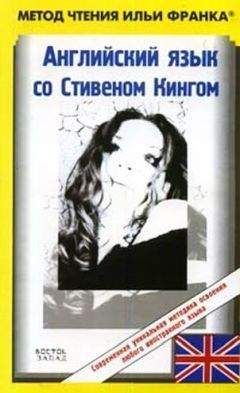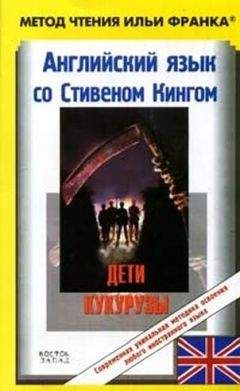Stephen King - Английский язык с Стивеном Кингом "Кадиллак» Долана"
assembly [q'semblI], account [q'kaunt], slight [slaIt]
I looked through the want ads, made — some telephone calls, and then went out to look at five used vehicles that were within my financial reach. I settled for a battered Ford van that had rolled off the assembly line the same year Elizabeth was killed. I paid cash. I was left with only two hundred and fifty-seven dollars in my savings account, but this did not disturb me in the slightest. On my way home I stopped at a rental place the size of a discount department store and rented a portable air compressor, using my MasterCard as collateral.
Late Friday afternoon I loaded the van (ближе к вечеру в пятницу я погрузил в фургон): picks (кирки), shovels (лопаты), compressor (компрессор), a hand-dolly (тачку), a toolbox (ящик с инструментами), binoculars (бинокль), and a borrowed Highway Department Jackhammer (и позаимствованный в департаменте дорожного управления отбойный молоток) with an assortment of arrowhead-shaped attachments (с набором клиноообразных насадок; arrow — стрела; attachment — крепление; прикрепление; присоединение) made for slicing through asphalt (предназначенных для разбивания асфальта; to slice — резатьломтикамиилислоями, нарезать, разрезать). A large square piece of sand-colored canvas (огромный квадратный кусок брезента песочного цвета), plus a long roll of canvas (плюс длинный рулон брезента) — this latter had been a special project of mine last summer (последний был моим особым проектом прошлым летом) — and twenty-one thin wooden struts (и двадцать одну деревянную распорку; strut — стойка; подкос, распорка), each five feet long (каждая по пять футов в длину). Last but not least (и последний, но не по значению: «последний, но не наименьший»), a big industrial stapler (большой промышленный степлер).
On the edge of the desert I stopped at a shopping center (на краю пустыни я остановился у торгового центра) and stole a pair of license plates (украл пару номерных знаков) and put them on my van (и поставил их на свой фургон).
binoculars [bI'nOkjulqz], asphalt ['xsfxlt], strut [strAt]
Late Friday afternoon I loaded the van: picks, shovels, compressor, a hand-dolly, a toolbox, binoculars, and a borrowed Highway Department Jackhammer with an assortment of arrowhead-shaped attachments made for slicing through asphalt. A large square piece of sand-colored canvas, plus a long roll of canvas — this latter had been a special project of mine last summer — and twenty-one thin wooden struts, each five feet long. Last but not least, a big industrial stapler.
On the edge of the desert I stopped at a shopping center and stole a pair of license plates and put them on my van.
Seventy-six miles west of Vegas (/через/ шестьдесят шесть миль к западу от Вегаса), I saw the first orange sign (я увидел первый оранжевый знак): CONSTRUCTION AHEAD PASS AT YOUR OWN RISK («Впереди /ведутся/ ремонтные работы. Проезжайте на свой /страх и/ риск»). Then, a mile or so beyond that (затем, через милю или около того, дальше), I saw the sign I had been waiting for since (я увидел знак, который я ждал с тех пор) ... well, ever since Elizabeth died, I suppose (в общем, постоянно, с тех пор как умерла Элизабет, я так думаю), although I hadn't always known it (хотя я и не всегда осознавал это; to know — знать; понимать, осознавать).
DETOUR AHEAD 6 MILES («Объезд впереди /через/ 6 миль»).
Dusk was deepening toward dark (сумерки сгущались, становилось темно: «сумерки усиливались в сторону темноты»; todeepen— делаться глубже, углубляться; усиливать, усугублять; toward— в направлении) as I arrived and surveyed the situation (когда я приехал и изучил ситуацию; tosurvey — проводить комплексное исследование, тщательно изучать). It could have been better if I'd planned it, but not much (она была бы лучше, если бы я планировал ее, но ненамного).
own [qun], toward ['tquqd], situation ["sICu'eIS(q)n]
Seventy-six miles west of Vegas, I saw the first orange sign: CONSTRUCTION AHEAD PASS AT YOUR OWN RISK. Then, a mile or so beyond that, I saw the sign I had been waiting for since... well, ever since Elizabeth died, I suppose, although I hadn't always known it.
DETOUR AHEAD 6 MILES.
Dusk was deepening toward dark as I arrived and surveyed the situation. It could have been better if I'd planned it, but not much.
The detour was a right turn between two rises (объезд был правым поворотом можду двумя холмами = поворот на объезд был справа, между двумя холмами; to rise — вставать, подниматься; rise — возвышенность, холм). It looked like an old fence-line road (он выглядел, как старая проселочная дорога: «дорога вдоль забора»; line — веревка, граница, пограничнаялиния) which the Highway Department had smoothed and widened to temporarily accommodate the heavier traffic flow (которую департамент дорожного управления разровнял и расширил, чтобы временно приспособить для более интенсивного потока движения; heavy — тяжелый; сильный, интенсивный). It was marked by a flashing arrow powered by a buzzing battery in a padlocked steel box (он был отмечен мигающей стрелкой, которую питала гудящая батарея в закрытом на висячий замок стальном ящике).
Just beyond the detour (сразу за /поворотом на/ объезд), as the highway rose toward the crest of that second rise (где шоссе поднималось к вершине второго холма; crest — гребешок, хохолок; вершина/горы/; to rise), the road was blocked off by a double line of road cones (дорога была перегорожена двойным рядом дорожных конусов). Beyond them (за ними) (if one was so extraordinarily stupid as to have (если кто-нибудь окажется настолько необычайно тупым, чтобы), first, missed the flashing arrow and (во первых, не заметить мигающую стрелку), second, run over the road cones without realizing it (переехать дорожные конусы, даже не поняв этого) — I suppose some drivers were (думаю, некоторые водители относятся к таковым)) was an orange sign almost as big as a billboard (был оранжевый знак, почти такой же большой, как рекламный щит = величиной почти с рекламный щит), reading ROAD CLOSED USE DETOUR (гласящий: «Дорога закрыта. Проезжайте в объезд: «используйте объезд»»).
temporarily ['temp(q)r(q)r(q)lI], extraordinarily [ek'strLd(q)n(q)rqlI], stupid ['stjHpId]
The detour was a right turn between two rises. It looked like an old fence-line road which the Highway Department had smoothed and widened to temporarily accommodate the heavier traffic flow. It was marked by a flashing arrow powered by a buzzing battery in a padlocked steel box.
Just beyond the detour, as the highway rose toward the crest of that second rise, the road was blocked off by a double line of road cones. Beyond them (if one was so extraordinarily stupid as to have, first, missed the flashing arrow and, second, run over the road cones without realizing it — I suppose some drivers were) was an orange sign almost as big as a billboard, reading ROAD CLOSED USE DETOUR.
Yet the reason for the detour was not visible from here, and that was good (и все же причина, почему надо было объезжать, была не видна отсюда, и это было хорошо). I didn't want Dolan to have the slightest chance of smelling the trap before he fell into it (я не хотел, чтобы у Долана был хотя бы малейший шанс почуять ловушку, прежде чем он попадет/упадет в нее).
Moving quickly (двигаясь быстро) — I didn't want to be seen at this (я не хотел, чтобы меня видели за этим /занятием/) — I got out of the van (я вышел из фургона) and quickly stacked up some dozen of the road cones (и быстро сдвинул в кучу около дюжины дорожных конусов; tostack— складывать в стог, в кучу, в штабель), creating a lane wide enough for the van (создавая проезд, достаточно широкий для фургона; lane— узкая дорога, тропинка; проход). I dragged the ROAD CLOSED Sign to the right (я оттащил знак «Дорога закрыта» вправо), then ran back to the van (затем вернулся бегом в фургон), got in (сел в него), and drove through the gap (и проехал через /образовавшийся/ промежуток).
Now I could hear an approaching motor (теперь = итут я услышал /звук/ приближающегося мотора).
reason ['rJz(q)n], dozen ['dAz(q)n], approaching [q'prquCIN]
Yet the reason for the detour was not visible from here, and that was good. I didn't want Dolan to have the slightest chance of smelling the trap before he fell into it.
Moving quickly — I didn't want to be seen at this — I got out of the van and quickly stacked up some dozen of the road cones, creating a lane wide enough for the van. I dragged the ROAD CLOSED Sign to the right, then ran back to the van, got in, and drove through the gap.
Now I could hear an approaching motor.



